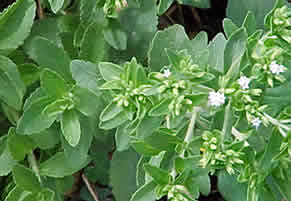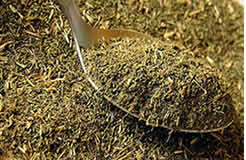Potential Anti-hypertensive Health Benefits of Stevia
The Division of Cadiovascular Medicine in Taipei Wan Fang Hospital studied the effects of intravenous stevioside (compound found in stevia) on the blood pressure in spontaneously hypertensive rats. Results have shown that the hypotensive effect on both systolic and diastolic blood pressure was dose-dependent for intravenous doses of 50, 100 and 200 mg/kg. The maximum reductions in systolic and diastolic blood pressure were 31.4 +/- 4.2% and 40.8 +/- 5.6% (mean +/- SEM) respectively and the hypotensive effect lasted for more than 60 min with a dose of 200 mg/kg. The study suggests that stevioside given intravenously to conscious SHR was effective in blood pressure reduction. (Source: Life Sciences, 1998)
Antioxidant, Anti-diabetic and Renal Protective Health Benefits of Stevia rebaudiana.
The Defence Food Research Laboratory, Mysore, India, studied the effects of stevia leaves and its extracted polyphenols and fibers on streptozotocin-induced diabetic rats. Results have shown a reduction of blood glucose, ALT and AST, and increment of insulin level in the stevia whole leaves powder and extracted polyphenols fed rats compared to control diabetic group. Stevia also reduced the MDA concentration in liver and improved its antioxidant status through antioxidant enzymes. Glucose tolerance and insulin sensitivity were likewise improved. Kidney damage due streptozotocin was also alleviated. The study further suggests that stevia leaves do have a significant role in alleviating liver and kidney damage in the STZ-diabetic rats besides its hypoglycemic effect. (Source: Journal of Diabetes and its Complications. March 2013)
Potential Anti-cancer Health Benefits of Stevioside Against Human Breast Cancer Cells
The Department of Molecular Biology and Biotechnology, University of Kalyani, India, conducted an experiment to determine if stevioside (compound found in stevia) has anti-cancer activity. The cytotoxicity, induction of apotosis, and putative pathways of its action was investigated in human breast cancer cells. Results have shown that stevioside was a potent inducer of apoptosis and it conveyed the apoptotic signal via intracellular ROS generation. This study showed that stevioside has promising effects on stress-related transcription factors like NF-E2-related factor-2 which suggests further investigation. (Source: Journal of Nutrition and Cancer, 2012)
Potential Antituberculosis Health Benefits of Stevia Rebaudiana
Synthesized derivatives of compound found in stevia rebaudiana were investigated if it has antitubercular activity. Results have shown that the compounds and their synthetic derivatives inhibit the growth of Mycobacterium tuberculosis (H37Rv in vitro). The antitubercular activity of synthesized stevia compound is higher than Pyrizanamide, a known antitubercolis drug but lower than the activity of antitubercular drug Isoniazid. (Source: Bioorganicheskaia Khimiia. July 2011)
Antibacterial Health Benefits from Stevia triflora
The Facultad de Ciencias, Universidad de Los Andes in Venezuela. Investigated the antimicrobial activity of aerial parts of stevia triflora against several strains of Gram-positive and Gram-negative bacteria and the yeast Candida albicans, using the agar diffusion method. Results have shown that it exhibited moderated activity against Corynebacterium diphtheria, Staphylococcus aureus, Escherichia coli and Candida albicans. To a lesser degree, octaacetylombuoside and retusine showed activity against the Gram-positive bacteria C. diphtheria and S. aureus, but proved to be inactive against Gram-negative bacteria and Candida albicans. (Source: Annales Pharmaceutiques Francaises, 1997)
Evaluation of the cariogenic potential of the intense natural sweeteners stevioside and rebaudioside A.
The Department of Pediatric Dentistry, University of Illinois, Chicago studied the the compounds stevioside and rebaudioside A, found in Stevia rebaudiana, for cariogenicity in albino Sprague-Dawley rats. Four groups of rats were given different dosage of stevia compounds and were sacrificed after 5 weeks of treatment. Results were evaluated using S. sobrinus counts and caries scores were evaluated according to Keyes' technique. There were no differences in food and water intake and weight gains between the four groups. There were significant differences in sulcal caries scores (p < 0.02) and S. sobrinus counts (p < 0.05) between group 1 and the other three groups. There were no significant differences between the stevioside, rebaudioside A and no-addition groups. It was concluded that neither stevioside nor rebaudioside A is cariogenic under the conditions of this study.(Source: Caries Research, 1992)




